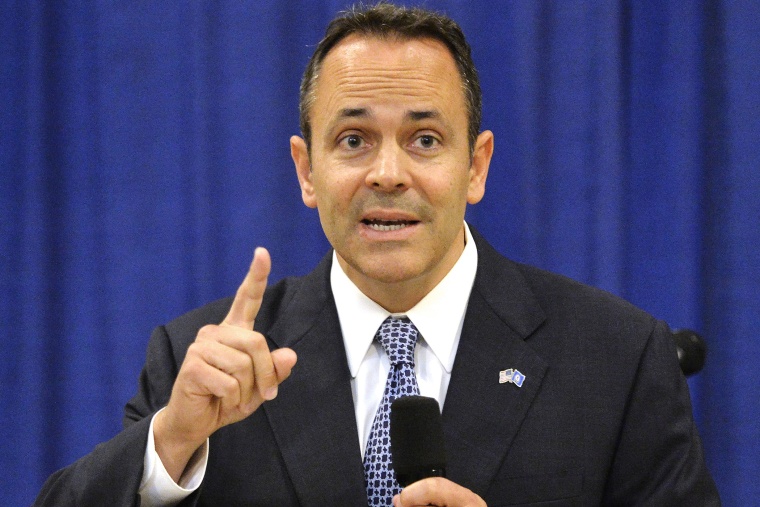Louisville Mayor Greg Fischer (D) told the Louisville Courier-Journal this week that solutions to violence in his community "are many, but a lot of them require resources obviously" from housing to education and health care.
Kentucky's Republican governor apparently has a different approach in mind.
Gov. Matt Bevin said in a jam-packed meeting Thursday that his plan to confront Louisville's growing violence is to have roaming prayer groups in the West End.Bevin urged faith leaders, public officials and residents to take a 10-block span, walk corner to corner, and pray with the community two to three times a week during the next year.
On Twitter, the far-right governor added, "Prayer WILL change things.... Prayer is powerful, and a people united in prayer will make a difference in their communities."
It's worth clarifying, Bevin isn't talking about supplementing new investments in housing, education, and health care with faith-based community activism. By all appearances, the governor wants Louisville residents to effectively create "prayer patrols" -- in lieu of increased spending on housing, education, and health care.
It's probably best to put aside questions about whether prayer is an effective tool in combating urban violence. Instead, let's deal with the substantive problems with Bevin's recommended approach.
Right off the bat, there are constitutional principles to consider. In our system, the government is supposed to be neutral on matters of religion. Bevin generally champions the idea of limited government, but when a governor uses the power of his office to encourage constituents to worship, that's evidence of a pretty big government.
But let's not brush past the fact that turning to supernatural solutions to address earthly problems isn't a responsible approach to policymaking.
Yesterday, we talked about Rep. Tim Walberg (R-Mich.), a former church pastor, who told constituents last week that he's content to let God "take care of" the climate crisis. This week, it's Kentucky's Matt Bevin (R) pointing to prayer to solve rising violence in Louisville.
Obviously, these officials, like everyone else, are free to believe what they wish about religion. Faith is a personal matter. If Walberg and Bevin want to believe a Supreme Being will intervene in human affairs and solve policy challenges, that's their right.
But as we discussed yesterday, this isn't a responsible approach to modern policymaking. Lawmakers and governors are hired to at least try to solve problems, not ignore them and wait for supernatural solutions.
In Louisville, Rev. Joe Phelps of the Highland Baptist Church told a local station that prayer patrols backed by the governor are "not the answer" the city needs. Phelps added, "For him to reduce the problems of violence to getting people to go pray for a block is an embarrassment to Christianity. I feel embarrassed for the Christian faith if the governor of Kentucky is saying these things as a solution to violence in our community."
